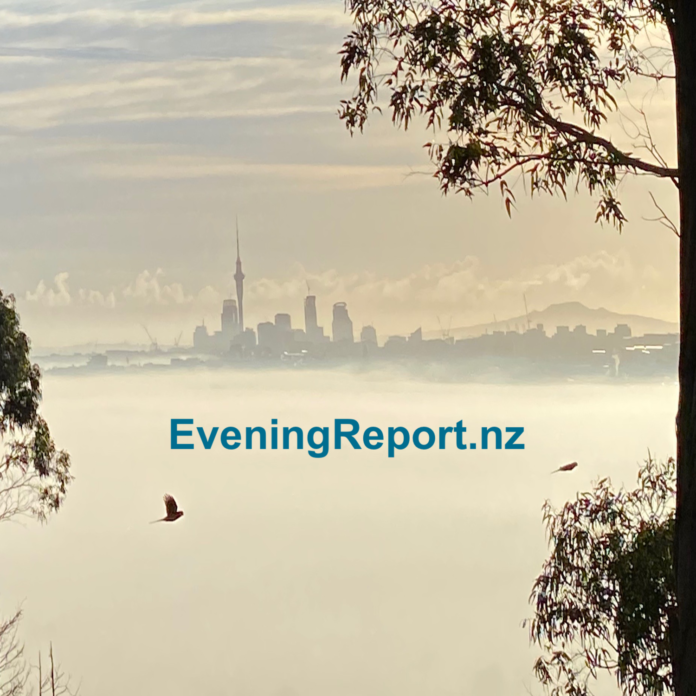SPECIAL REPORT: By Te Aniwaniwa Paterson
Hawai’ian academic Dr Emalani Case has condemned the 2024 Rimpac military exercise that began off the coast of Hawai’i today, saying the military personnel from 29 countries taking part are “practising to invade”.
“They call it practising defence but they’re really learning how to defend an empire while putting indigenous people at risk,” she said.
Hawai’i has been heavily impacted on by militarisation.
Dr Case, a senior lecturer at Auckland University, said her people had had to deal with military harm and damage to their people and environment for more than 100 years.
The kingdom of Hawai’i was invaded by the US in 1893. The monarchy was overthrown, and the islands have stayed under US control since, with several large military bases.
Dr Case said the military made it a hard place to live when the land and people were routinely dismissed and disregarded.
The US Navy had publicly said it was committed to the environment and reducing harm.
Nonetheless, it had had a highly destructive track record when it came to pollution and environmental harm, she said.
For example, SINKEX was an activity during Rimpac where various navies shoot ammunition at decommissioned ships off the coast of Kauai island.
Dr Case told Te Ao Māori News, “The ships just sink and they leave them there. So there are toxins leaking out into our ocean.”
Anti-war groups demand end to war games as Rimpac begins. Video: Hawai’i News Now
Tourism paradise?
Te Ao Maōri News asked Dr Case why Hawai’i was known as a “paradise” tourist destination but many people did not know about the violent history.
Dr Case referenced the works of the late Dr Teresia Teaiwa, an I-Kiribati and African-American scholar, who had said tourism and military worked together to dispossess and displace Hawai’ians.
“‘Militourism’ is a phenomenon by which a military or paramilitary force ensures the smooth running of a tourist industry, and that same tourist industry masks the military force behind it.”
— Teresia Teaiwa
Tourism masked the military violence by placing a flower over it, or a swinging hula girl, Dr Case said.
“[Hawai’i] is beautiful but the US military is one of the biggest abusers of that beauty.”
The people of Hawai’i were often left behind and focus placed on tourists, yet residents were without enough water or resources to house and care for the people. Dr Case said this explained the “enormous diaspora of Kānaka Maoli” living outside Hawai’i.
“We cannot be thinking about relying on the 25,000 personnel who are going to be coming, bringing their dollars, but also bringing their violence, bringing the increase in sex trafficking, bringing in an increase in violence against women.”
The only year there was not an increase in sex trafficking and violence during Rimpac was in 2020 because of the covid-19 pandemic, which downscaled Rimpac and meant military personnel were not able to go ashore, she said.
“That’s what they’re bringing to our islands.”
Violent attack on akua
Kānaka Maoli say they have a spiritual and genealogical connection to the oceans and lands. This includes Kanaloa and Papahānaumoku, the gods of ocean and earth, which is similar to Tangaroa and Papatūānuku in Aotearoa.
Papahānaumoku is the akua in Hawai’i that births their moku, islands.
“Any assaults against our akua, our gods, is an assault against us, it’s an assault against our whakapapa, it’s an assault against everything that we stand for,” Dr Case said.
Dr Case grew up and her whānau still live in Waimea, 45 minutes from Pōhakuloa, one of the largest military training facilities. She grew up feeling and hearing bombs all the time.
“I grew up hearing and feeling bombs all the time and it’s a kind of pain you don’t ever want to experience because you know what’s happening to Papa, what’s happening to your family. We view land, mountains, rivers, ocean as family.”
— Emalani Case
Rimpac and Palestine, West Papua and Kanaky
Rimpac was an international issue, Dr Case said, and a gateway event.
“We’ve got to think about these colonial nations coming together to train and provide so-called security and safety to the world while really putting all of us at risk, who have never been deemed human enough to be worthy of that same safety and security,” she said.
The nations participating in Rimpac include Israel and Indonesia.
Dr Case said her homeland was being turned into a training ground for “imperial genocidal regimes” which learned, practised and honed their skills to then commit genocide in Palestine and West Papua.
She also cited the participation of France, which had no proximity to the Pacific but had “oppressed Pacific brothers and sisters in the French-occupied Kanaky”.
“Militarism is upheld by and supports settler colonialism. It supports white supremacy.”
Dr Case said calling for an end to Rimpac and demanding that New Zealand withdraw was not just about saving Hawai’i.
She said boycotting Rimpac was about peace, demilitarisation, decolonisation and climate justice.
“The US military is one of the largest contributors of pollutants into the environment.”
Rimpac and FestPAC
Dr Case was in Hawai’i for Protecting Oceania, part of FestPAC — the festival of Pacific arts and culture hosted by Hawai’i this year.
She said there was a lot of discussion about Rimpac during Protecting Oceania.
“Rimpac and FestPAC didn’t happen at the exact same time but it’s interesting to think about the convergence of these cultural celebrations and violent military detonations around the same time, in the same waters, and on the same land.”
She was pleased to see people holding banners saying “STOP RIMPAC” in the closing ceremony at FestPAC. She said culture and politics went hand in hand.
Te Aniwaniwa Paterson is a digital producer for Te Ao Māori News. This article is republished with permission.
Article by AsiaPacificReport.nz






